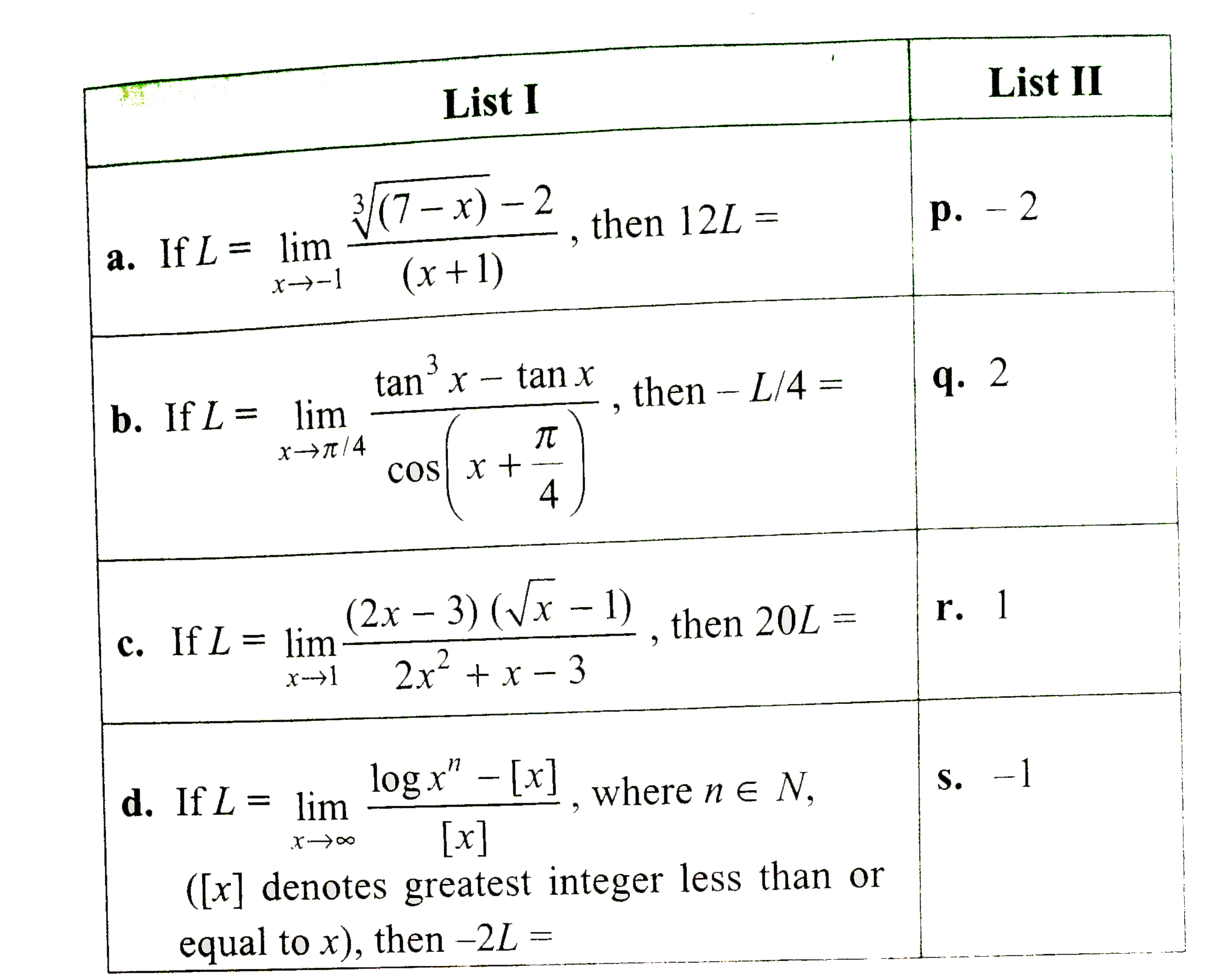limx→π2sin(xcosx)cos(xsinx) is equal to (a) 0 (b) π2 (c) π (d) 2πSolution in Bengali
The correct Answer is:B
L=limx→π/2sin(xcosx)sin(π2−xsinx)
L=limx→π2sin(xcosx)(xcosx)(π2−xsinx)sin(π2−xsinx)xcosx(π2−xsinx)
=1×1limx→π/2xcosx(π2−xsinx)
Put x=π/2+h. Then
L=limh→0(π2+h)cos(π2+h)π2−(π2+h)sin(π2+h)
=limh→0−(π2+h)sinhπ2(1−cosh)−hcosh
=limh→0−(π2+h)(sinhh)π2(1−cosh)h−cosh(Divide Nr and Dr by h)
=−(π2+0)10−1=π2
Topper's Solved these Questions
- BOOK - CENGAGE PUBLICATIONCHAPTER - LIMITSEXERCISE - Linked Comprehension Type20videos
LIMITS
- BOOK - CENGAGE PUBLICATIONCHAPTER - LIMITSEXERCISE - Matrix Match Type5videos
LIMITS
- BOOK - CENGAGE PUBLICATIONCHAPTER - LIMITSEXERCISE - EXERCISE 2.88videos
LIMITS
- BOOK - CENGAGE PUBLICATIONCHAPTER - JEE 2019EXERCISE - Chapter 108videos
JEE 2019
- BOOK - CENGAGE PUBLICATIONCHAPTER - LINEAR COMBINATION OF VECTORS, DEPENDENT AND INDEPENDENT VECTORSEXERCISE - DPP 1.210videos
LINEAR COMBINATION OF VECTORS, DEPENDENT AND INDEPENDENT VECTORS
Similar Questions
Letf(x)=sin−1(1−{x})×cos−1(1−{x})√2{x}×(1−{x}), where {x} denotes the fractional part of x.
L=limx→0−f(x) is equal to01:24View SolutionMatch the following lists:
 03:08View Solution
03:08View SolutionEvaluate limx→1cosπ2x1−√x
05:29View SolutionIf y = y(x) is the solution of the differential equation, xdydx+2y=x2 satisfying y(1) = 1, then y(12) is equal to
01:31View SolutionThe number of integral values of p for which (p+1)ˆi−3ˆj+pˆk,pˆi+(p+1)ˆj−3ˆk and −3ˆi+pˆj+(p+1)ˆk are linearly dependent vectors is q
02:27View SolutionThe value of sin−1(cos(cos−1(cosx)+sin−1(sinx))), where x∈(π2,π) , is equal to π2 (b) −π (c) π (d) −π2
05:08View Solution(lim)x→0(sin(πcos2x)x2) is equal to (a) −π (b) π (c) π2 (d) 1
03:56View Solution(lim)x→∞x2sin((log)e√cosπx) a. 0 b. π22 c. π24 d. π28
04:58View Solution∫π/20xsinx dx is equal to π/2 b. π/4 c. π d. 1
01:21View Solution∫π/20sin2xlogtanx dx is equal to π/2 b. π c. 0 d. 2π
02:53View SolutionPeriod of f(x)=sin4x+cos4x is- π b. π2 c. 2π d. none of these
05:27View SolutionThe sum of all x∈[0,π] which satisfy the equation sin x+12cosx=sin2(x+π4) is - (A) π6 (B) 5π6 (C) π (D) 2π
04:28View Solutionlimx→π/2sin(xcosx)cos(xsinx) is equal to
04:19View Solution[sin(x−π)+cos(x−π/2)]⋅cos(x−2π)=___________.
06:33View Solutionsin−1x+cos−1x,x∈[−1,1]=
(A)0(B)π2(C)π(D)2π01:31View Solutionlimx→π/2sin(xcosx)cos(xsinx) is equal to
04:11View Solution

